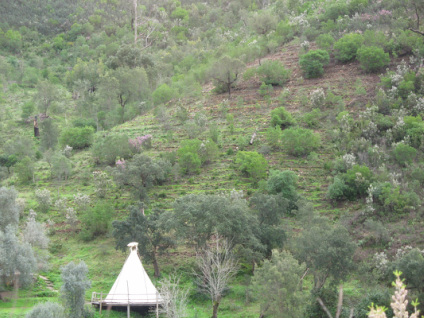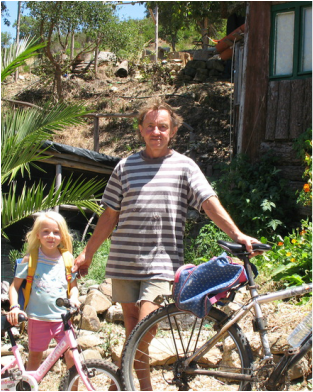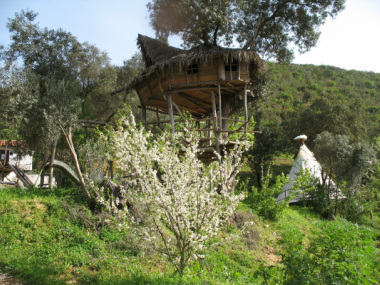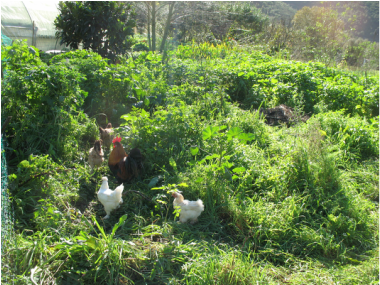Spring 2015 Permaculture Internship
9th May to 21st June 2015
Várzea da Gonçala presents an six-week learning experience.
Participants will be, on a daily basis, be instructed in the practical application of permaculture, gaining hands-on expertise of sustainable living in harmony with the ecosystem. The extended length of the program allows the essential connection between theory and its application.
Participants will be, on a daily basis, be instructed in the practical application of permaculture, gaining hands-on expertise of sustainable living in harmony with the ecosystem. The extended length of the program allows the essential connection between theory and its application.
The Curriculum
The curriculum for the six weeks is a coordination of theory and hands-on field work. We have a widely-experienced teaching team to guide students through diverse aspects of an inventive, productive and sustainable smallholding. We totally believe that practical action is fundamental to creating connection with, and understanding of, nature's way.
Permaculture is a model of design which works in harmony with nature's ways and patterns, and informs our thinking. We are keen to point out that it explains natural processes, and its principles act as guidelines to our approach, not a set of instructions for how to proceed.
The Course Objectives
The Internship incorporates the internationally certificated 72-hour PDC, and the structure of the course is designed to intimitely connect, on a daily basis, the teachings of permaculture to their application. This allows a deep understanding of natural processes, and of how we can positively interact with them to produce long-term sustainable results.
Among the subjects covered on the course, will be...
The Internship incorporates the internationally certificated 72-hour PDC, and the structure of the course is designed to intimitely connect, on a daily basis, the teachings of permaculture to their application. This allows a deep understanding of natural processes, and of how we can positively interact with them to produce long-term sustainable results.
Among the subjects covered on the course, will be...

- Holistic observation of the land and it's potential
- Organic no-dig vegetable gardening
- Gardening with perennials, bushes and trees
- Preservation and uses of vegetables and fruits
- Medicinal herbs, identification and uses
- Natural building techniques
- Water management and soil-development.
- Ecosystem restoration and re-forestation.
- Grey water systems.
- Solar energy systems
- Animals in permaculture: use and integration
- Social permaculture
- A grounded, practical view of local community development
There will also be opportunities to visit other projects in the region, as well as taking in the local culture of the west Algarve of Portugal, and the outstanding coastline and surfing beaches.
The Venue
The venue, Várzea da Gonçala, is an eight-year-old permaculture project at an interesting stage of its development, with a great diversity of terrain and microclimates providing fascinating variety of learning scenarios. The course will cover a diverse range of aspects, reflecting the development of the Várzea's long-term goals of a productive, beautiful, fire-resisting, natural ecosystem, with increasing self-sufficiency in food and energy.
Surrounding the Várzea is a wider community of neighbours, some relative newcomers, others with longer experience, moving towards a productive reciprocal cultural interaction and mutual self-help.
Housing & Food
Participants are housed in traditional farmhouse cottage accommodation, of rammed-earth (taipa) walls. The rooms are shared, though it may be possible to reserve a double room for a couple. Community living space includes solar showers, compost toilets, classrooms, shared kitchen, a library, our communal social space ("the pit") with fire, bread oven, and projector for film-screening, and there are several peaceful, secluded areas for personal reflection. The river has pools for bathing or relaxing, and there is also a plunge-pool by the houses for cooling on hot days.
All the Internship participants share responsibility in running the site and making it their home. We share cooking, and daily routine tasks. We also enjoy life together, creating time for music, stories & laughter, while respecting the need for personal space and time also. The hope is to cultivate mutual respect and communication, as well as connection to the nature of which are part.
The venue, Várzea da Gonçala, is an eight-year-old permaculture project at an interesting stage of its development, with a great diversity of terrain and microclimates providing fascinating variety of learning scenarios. The course will cover a diverse range of aspects, reflecting the development of the Várzea's long-term goals of a productive, beautiful, fire-resisting, natural ecosystem, with increasing self-sufficiency in food and energy.
Surrounding the Várzea is a wider community of neighbours, some relative newcomers, others with longer experience, moving towards a productive reciprocal cultural interaction and mutual self-help.
Housing & Food
Participants are housed in traditional farmhouse cottage accommodation, of rammed-earth (taipa) walls. The rooms are shared, though it may be possible to reserve a double room for a couple. Community living space includes solar showers, compost toilets, classrooms, shared kitchen, a library, our communal social space ("the pit") with fire, bread oven, and projector for film-screening, and there are several peaceful, secluded areas for personal reflection. The river has pools for bathing or relaxing, and there is also a plunge-pool by the houses for cooling on hot days.
All the Internship participants share responsibility in running the site and making it their home. We share cooking, and daily routine tasks. We also enjoy life together, creating time for music, stories & laughter, while respecting the need for personal space and time also. The hope is to cultivate mutual respect and communication, as well as connection to the nature of which are part.
Course Itinerary
The Internship runs for six weeks, five days a week. Each week is structured with a daily schedule, covering, on a flexible basis, the following broad areas on the same days each week: Gardening and food production, Natural building, Medicinal herbs and their uses, Energy, pumping, irrigation systems and grey water, and Fridays, water in the land, trees, and soil.
There will also be sessions on the topic of social and community functioning and development, with visits to local smallholdings and projects with diverse approaches to living on the land. The subject of an alternative education of the growing number of children in our valley is covered, with Thursdays, when the local valley home-schooling group has their "tipi day" at the Várzea, providing an opportunity to discuss this project.
The schedule also includes weekly baking and pizza nights, film nights, tipi nights, and music/jamming evenings, usually joined by some of our friends and neighbours.
The Internship runs for six weeks, five days a week. Each week is structured with a daily schedule, covering, on a flexible basis, the following broad areas on the same days each week: Gardening and food production, Natural building, Medicinal herbs and their uses, Energy, pumping, irrigation systems and grey water, and Fridays, water in the land, trees, and soil.
There will also be sessions on the topic of social and community functioning and development, with visits to local smallholdings and projects with diverse approaches to living on the land. The subject of an alternative education of the growing number of children in our valley is covered, with Thursdays, when the local valley home-schooling group has their "tipi day" at the Várzea, providing an opportunity to discuss this project.
The schedule also includes weekly baking and pizza nights, film nights, tipi nights, and music/jamming evenings, usually joined by some of our friends and neighbours.
The Course Leaders
Daphna Givon
Born and raised in Israel, Daphna did her national service on an ecological farm, spending 3 years living, learning and practicing permaculture, sustainability education and community living.
In the following years Daphna was working on natural building projects around Israel and Portugal, and, having finished her PC diploma (2010), is teaching official Permaculture Design Courses.
Following her love for medicinal herbs, she completed Aromatherpy studies (2012) and is presently using medicinal herbs to create alternative and natural medicine and cosmetics.
 Arturo and Daphna
Arturo and Daphna
Arturo Whitelegg
After working in the modern conventional agriculture in Argentina, and finishing his degree in Environmental Management, Arturo decided to move to Panama to study Permaculture in 2004. Since then, he practiced the method in several countries throughout Central and South America (04´-07), Portugal (07´-11´) and Israel (11´-13´). Observing and studying nature's and people's behaviour, seeking the most efficient way to implement permaculture in the different environments.
For the past few years he lived in Israel working at an ecological farm instructing Permaculture in English and designing sustainable systems, while studying and learning about sustainable living. He is now back in Portugal once more.
After working in the modern conventional agriculture in Argentina, and finishing his degree in Environmental Management, Arturo decided to move to Panama to study Permaculture in 2004. Since then, he practiced the method in several countries throughout Central and South America (04´-07), Portugal (07´-11´) and Israel (11´-13´). Observing and studying nature's and people's behaviour, seeking the most efficient way to implement permaculture in the different environments.
For the past few years he lived in Israel working at an ecological farm instructing Permaculture in English and designing sustainable systems, while studying and learning about sustainable living. He is now back in Portugal once more.

Chaym Feldman
Chaym Feldman , graduate of the Arava Institute of Environmental Studies , majored in Geography and General History in the Tel Aviv university,, and studied plant sciences in the faculty of Agriculture , worked with traditional Palestinian farmers in the west bank and created with a fellow Palestinian farmer a method called Bio-Falcha which integrates traditional local agriculture lore with world-wide ecological knowledge, worked and managed several eco-farms and farms in israel, U.S and Tanzania , and taught children and adults Eco-gardening for more then 14 years.
Chaym Feldman , graduate of the Arava Institute of Environmental Studies , majored in Geography and General History in the Tel Aviv university,, and studied plant sciences in the faculty of Agriculture , worked with traditional Palestinian farmers in the west bank and created with a fellow Palestinian farmer a method called Bio-Falcha which integrates traditional local agriculture lore with world-wide ecological knowledge, worked and managed several eco-farms and farms in israel, U.S and Tanzania , and taught children and adults Eco-gardening for more then 14 years.
 Chris Lewis, with daughter Megan
Chris Lewis, with daughter Megan
Chris Lewis
Chris graduated in Ecology at the University of Edinburgh, before moving into beer-brewing, and starting up and running a microbrewery in England.
Along with his wife Christine, they bought the then long-neglected Várzea da Gonçala in early 2007, and since then have worked steadily to turn it into a flourishing smallholding and educational centre.
Chris sees the Várzea continuing to evolve and develop in the years to come as a productive natural, fire-resisting ecosystem.
Chris graduated in Ecology at the University of Edinburgh, before moving into beer-brewing, and starting up and running a microbrewery in England.
Along with his wife Christine, they bought the then long-neglected Várzea da Gonçala in early 2007, and since then have worked steadily to turn it into a flourishing smallholding and educational centre.
Chris sees the Várzea continuing to evolve and develop in the years to come as a productive natural, fire-resisting ecosystem.
A picture of the Várzea da Gonçala story can be seen by viewing the feature article published in Permaculture Magazine, issue 77, autumn 2013 - follow the link for direct access... http://www.permaculture.co.uk/media/pdfs/PM77_P62-67.pdf
... and a candid view of Várzea life can be seen by visiting our blog - please take the link at the top of the home page.
... and a candid view of Várzea life can be seen by visiting our blog - please take the link at the top of the home page.
The course will commence on Monday, 11th May, and participants should arrive on Friday, 8th or Saturday, 9th, May, to acquaint themselves with the venue and the people. There will be an inauguration pizza night on Saturday, 9th.
The price for the six weeks is €900, fully inclusive of cottage accommodation, meals, and all facilities. This equates to €150 per week. No partial refunds will be given for participants who do not complete the six weeks.
We shall be accepting a maximum of seven participants, as we feel that this will provide the right balance to make the course proceed optimally.
To enrol, we ask for a deposit of €200. Details of how to pay can be found on the "booking" page.
Please feel free to write to us at: [email protected] if you have any questions.
The price for the six weeks is €900, fully inclusive of cottage accommodation, meals, and all facilities. This equates to €150 per week. No partial refunds will be given for participants who do not complete the six weeks.
We shall be accepting a maximum of seven participants, as we feel that this will provide the right balance to make the course proceed optimally.
To enrol, we ask for a deposit of €200. Details of how to pay can be found on the "booking" page.
Please feel free to write to us at: [email protected] if you have any questions.


